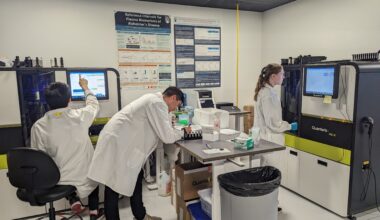Congratulations to our current Graduate Program in Neuroscience (GPN) students who have received awards through the Canada Graduate Scholarships – Master’s program from the Canadian Institutes of Health Research (CIHR).
Sarah Erwin
 Sarah Erwin is a Master’s student in Dr. Mark Cembrowski‘s lab. She received her Bachelor of Science in Animal Sciences from the Honors College at Michigan State University, where she worked as a research assistant in a monogastric animal nutrition lab and a technician at HHMI Janelia Research Campus. Sarah’s research combines molecular, circuit, and behavioural techniques to study the precise cell-type logic of memory in the brain. In her spare time, you can find her out on the water rowing with the Vancouver Rowing Club, or hiking with her dogs.
Sarah Erwin is a Master’s student in Dr. Mark Cembrowski‘s lab. She received her Bachelor of Science in Animal Sciences from the Honors College at Michigan State University, where she worked as a research assistant in a monogastric animal nutrition lab and a technician at HHMI Janelia Research Campus. Sarah’s research combines molecular, circuit, and behavioural techniques to study the precise cell-type logic of memory in the brain. In her spare time, you can find her out on the water rowing with the Vancouver Rowing Club, or hiking with her dogs.
Leah Kuzmuk
 Leah Kuzmuk is a Master’s student in Dr. Miriam Spering’s Oculomotor Laboratory. She joined the GPN in the fall of 2021 after obtaining her Bachelors of Science in Cognitive Systems at UBC, and subsequently worked with the Vancouver Stroke Program as a study manager. Leah’s research examines how eye movements can be used as a non-invasive tool to probe decision making and impulsivity in adults living with Parkinson’s Disease. She is a passionate contributor to the social and intellectual environment in the GPN and serves on the program’s admissions committee. Outside of her research activities, Leah is an avid road cyclist and runner with a love of the outdoors.
Leah Kuzmuk is a Master’s student in Dr. Miriam Spering’s Oculomotor Laboratory. She joined the GPN in the fall of 2021 after obtaining her Bachelors of Science in Cognitive Systems at UBC, and subsequently worked with the Vancouver Stroke Program as a study manager. Leah’s research examines how eye movements can be used as a non-invasive tool to probe decision making and impulsivity in adults living with Parkinson’s Disease. She is a passionate contributor to the social and intellectual environment in the GPN and serves on the program’s admissions committee. Outside of her research activities, Leah is an avid road cyclist and runner with a love of the outdoors.
Amanda Namchuk
 Amanda Namchuk is a Master’s student in Dr. Liisa Galea’s Laboratory of Behavioural Neuroendocrinology. She earned her Bachelor of Arts in 2019 from Washington University in St. Louis where she studied Philosophy-Neuroscience-Psychology and Anthropology. After working as a research assistant in a behavioral psychopharmacology lab for 2 years, she joined the Galea lab in 2021. Amanda’s current research project focuses on elucidating the sex-specific neurobiological mechanisms underlying negative cognitive bias, a common symptom of depression that most antidepressants fail to treat. Outside of the lab, she loves to run, hike, read and listen to podcasts.
Amanda Namchuk is a Master’s student in Dr. Liisa Galea’s Laboratory of Behavioural Neuroendocrinology. She earned her Bachelor of Arts in 2019 from Washington University in St. Louis where she studied Philosophy-Neuroscience-Psychology and Anthropology. After working as a research assistant in a behavioral psychopharmacology lab for 2 years, she joined the Galea lab in 2021. Amanda’s current research project focuses on elucidating the sex-specific neurobiological mechanisms underlying negative cognitive bias, a common symptom of depression that most antidepressants fail to treat. Outside of the lab, she loves to run, hike, read and listen to podcasts.
Romina Garcia de leon
 Romina Garcia de leon is a Master’s student in Dr. Liisa Galea’s Laboratory of Behavioural Neuroendocrinology. She completed her undergraduate degree at Carleton University, majoring in Neuroscience and Cognitive Science. Romina wishes to investigate reproductive periods and the neurobiological underpinnings that increase stress vulnerability and depression in females, and subsequently their offspring. To do this, her research focus is on a rodent model of postpartum depression (PPD) examining whether immune modulations improve antidepressant efficacy and increase stress resilience in offspring. Outside of the lab, Romina likes to spend time in the outdoors climbing, hiking and reading contemporary fiction.
Romina Garcia de leon is a Master’s student in Dr. Liisa Galea’s Laboratory of Behavioural Neuroendocrinology. She completed her undergraduate degree at Carleton University, majoring in Neuroscience and Cognitive Science. Romina wishes to investigate reproductive periods and the neurobiological underpinnings that increase stress vulnerability and depression in females, and subsequently their offspring. To do this, her research focus is on a rodent model of postpartum depression (PPD) examining whether immune modulations improve antidepressant efficacy and increase stress resilience in offspring. Outside of the lab, Romina likes to spend time in the outdoors climbing, hiking and reading contemporary fiction.
Judy Cheng
 Judy Cheng is a Master’s student in Dr. Lynn Raymond’s lab. During her undergraduate degree at UBC majoring in Behavioural Neuroscience, she completed a directed studies project in Dr. Raymond’s lab studying behavioural and cognitive deficits in a mouse model of Huntington’s disease. She loved learning about different aspects of the movement disorder and had the privilege to continue her studies as a Master’s student. In her research, Judy uses various methods to study calcium signalling in Huntington’s disease both in vitro and in vivo, such as live calcium imaging in neuronal cultures and fibre photometry combined with behavioural tests to compare calcium dynamics between Huntington’s and wild-type mice. Outside of the lab, she likes to stay active with sports such as volleyball and badminton, as well as explore new parks and overpriced restaurants in Vancouver.
Judy Cheng is a Master’s student in Dr. Lynn Raymond’s lab. During her undergraduate degree at UBC majoring in Behavioural Neuroscience, she completed a directed studies project in Dr. Raymond’s lab studying behavioural and cognitive deficits in a mouse model of Huntington’s disease. She loved learning about different aspects of the movement disorder and had the privilege to continue her studies as a Master’s student. In her research, Judy uses various methods to study calcium signalling in Huntington’s disease both in vitro and in vivo, such as live calcium imaging in neuronal cultures and fibre photometry combined with behavioural tests to compare calcium dynamics between Huntington’s and wild-type mice. Outside of the lab, she likes to stay active with sports such as volleyball and badminton, as well as explore new parks and overpriced restaurants in Vancouver.
Megan Liu
 Megan Liu is a Master’s student in Dr. Kiran Soma’s lab. She completed her Bachelor of Science in Neuroscience with Distinction at McGill University in 2020. As a first year MSc student in Neuroscience, she is currently using a wheel running task to study the motivation to exercise in rats, and is particularly interested in how this behaviour is regulated by local sex and stress steroids in the brain. She is also developing an ultrasensitive method for measuring multiple estrogens using liquid chromatography tandem mass spectrometry that is optimized for use in rats and mice. Outside of the lab, Megan likes to unwind through salsa dance, singing and exercise.
Megan Liu is a Master’s student in Dr. Kiran Soma’s lab. She completed her Bachelor of Science in Neuroscience with Distinction at McGill University in 2020. As a first year MSc student in Neuroscience, she is currently using a wheel running task to study the motivation to exercise in rats, and is particularly interested in how this behaviour is regulated by local sex and stress steroids in the brain. She is also developing an ultrasensitive method for measuring multiple estrogens using liquid chromatography tandem mass spectrometry that is optimized for use in rats and mice. Outside of the lab, Megan likes to unwind through salsa dance, singing and exercise.


